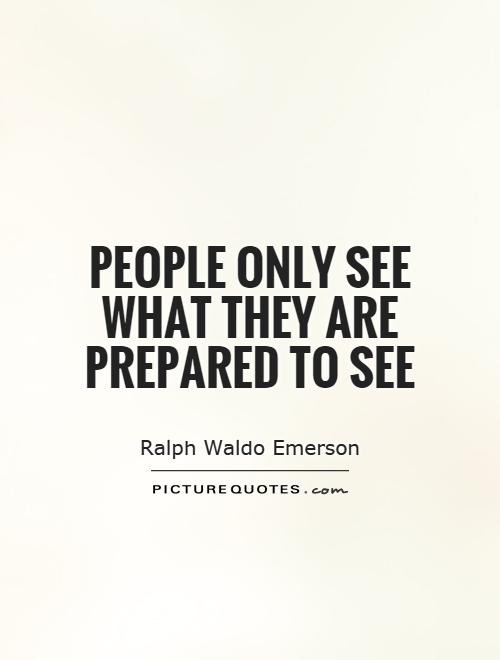People only see what they are prepared to see

People only see what they are prepared to see
Ralph Waldo Emerson, a renowned American essayist, lecturer, and poet, is often associated with the idea that "people only see what they are prepared to see." This concept, which is deeply rooted in Emerson's transcendentalist philosophy, emphasizes the importance of individual perception and understanding in shaping one's reality.Emerson believed that each person possesses a unique perspective and way of interpreting the world around them. He argued that our perceptions are influenced by our beliefs, experiences, and values, and that we are only able to see and understand things that align with our preconceived notions. In other words, our minds are limited by our own biases and limitations, and we are often blind to things that do not fit within our existing framework of understanding.
This idea is evident in Emerson's essay "Self-Reliance," where he encourages individuals to trust their own intuition and inner wisdom rather than conforming to societal norms and expectations. He believed that true insight and understanding come from within, and that we must be willing to challenge our own assumptions and beliefs in order to see the world more clearly.
Emerson's emphasis on individual perception and understanding also reflects his belief in the interconnectedness of all things. He saw the universe as a vast, interconnected web of relationships, where everything is linked and dependent on each other. In this context, our ability to see and understand the world is not just a matter of personal perception, but also a reflection of our connection to the larger whole.
Overall, Emerson's idea that "people only see what they are prepared to see" serves as a powerful reminder of the importance of self-awareness, open-mindedness, and critical thinking in shaping our understanding of the world. By being willing to challenge our own assumptions and biases, we can expand our perception and gain a deeper insight into the complexities of existence.












 Friendship Quotes
Friendship Quotes Love Quotes
Love Quotes Life Quotes
Life Quotes Funny Quotes
Funny Quotes Motivational Quotes
Motivational Quotes Inspirational Quotes
Inspirational Quotes